University Coursework: EVRE5017 Evaluation and Reflection Report
VerifiedAdded on 2023/01/11
|21
|6001
|1
Report
AI Summary
This report offers a detailed evaluation of work-based learning and reflective practices, focusing on the application of reflective models like the Gibbs Reflective Cycle and Kolb’s Experiential Learning Cycle. The student analyzes personal experiences related to employee retention, highlighting the importance of persuasion skills and empathy. The report includes a personal analysis of strengths and weaknesses, alongside an action plan for skill development and setting SMART goals to improve professional performance. The student reflects on an incident involving employee retention challenges and the lack of persuasion skills, recognizing the need for improved communication and emotional intelligence. The report also discusses the impact of the reflective process on the student's mindset and behavior, offering insights into personal and professional growth.
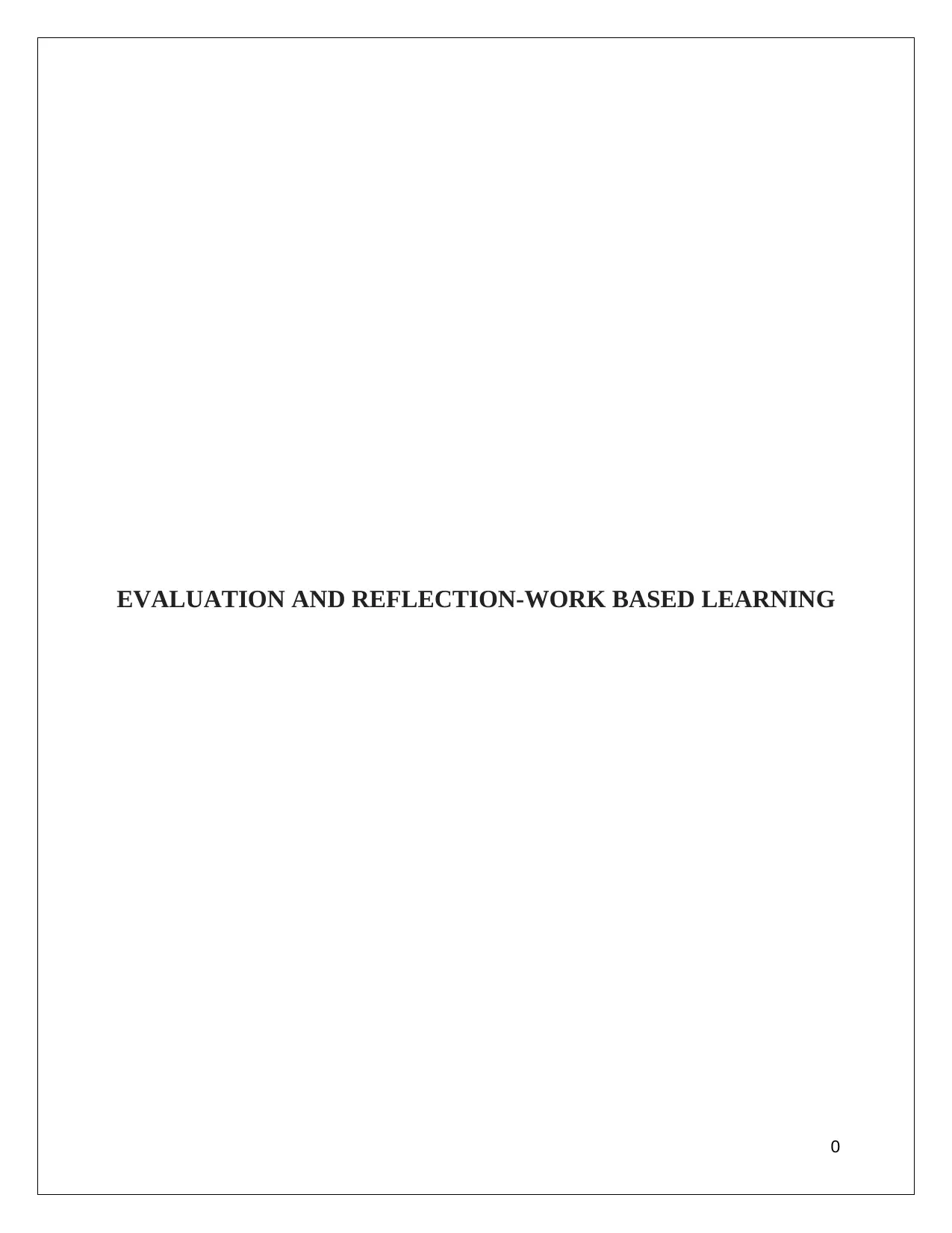
EVALUATION AND REFLECTION-WORK BASED LEARNING
0
0
Paraphrase This Document
Need a fresh take? Get an instant paraphrase of this document with our AI Paraphraser
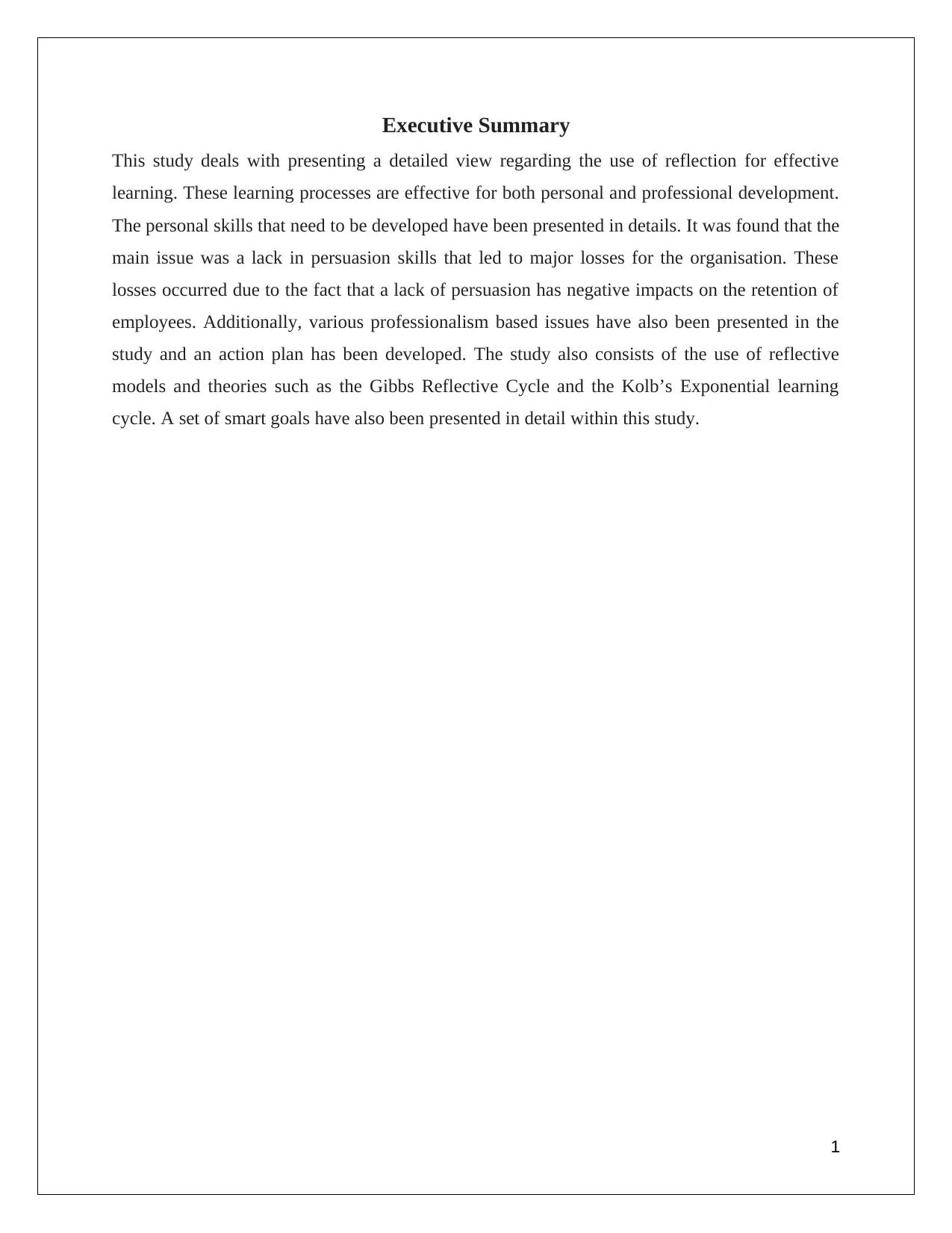
Executive Summary
This study deals with presenting a detailed view regarding the use of reflection for effective
learning. These learning processes are effective for both personal and professional development.
The personal skills that need to be developed have been presented in details. It was found that the
main issue was a lack in persuasion skills that led to major losses for the organisation. These
losses occurred due to the fact that a lack of persuasion has negative impacts on the retention of
employees. Additionally, various professionalism based issues have also been presented in the
study and an action plan has been developed. The study also consists of the use of reflective
models and theories such as the Gibbs Reflective Cycle and the Kolb’s Exponential learning
cycle. A set of smart goals have also been presented in detail within this study.
1
This study deals with presenting a detailed view regarding the use of reflection for effective
learning. These learning processes are effective for both personal and professional development.
The personal skills that need to be developed have been presented in details. It was found that the
main issue was a lack in persuasion skills that led to major losses for the organisation. These
losses occurred due to the fact that a lack of persuasion has negative impacts on the retention of
employees. Additionally, various professionalism based issues have also been presented in the
study and an action plan has been developed. The study also consists of the use of reflective
models and theories such as the Gibbs Reflective Cycle and the Kolb’s Exponential learning
cycle. A set of smart goals have also been presented in detail within this study.
1
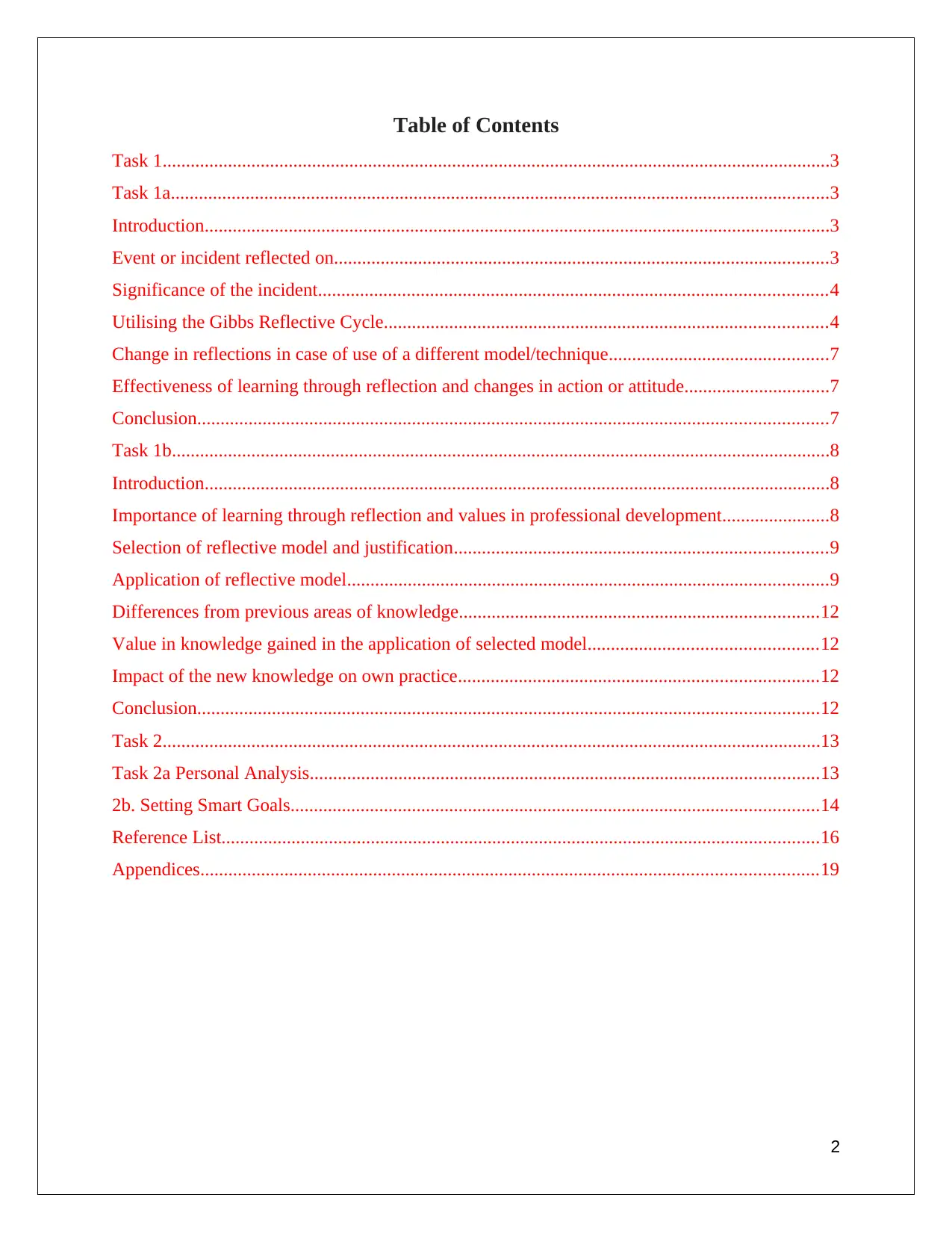
Table of Contents
Task 1...............................................................................................................................................3
Task 1a.............................................................................................................................................3
Introduction......................................................................................................................................3
Event or incident reflected on..........................................................................................................3
Significance of the incident.............................................................................................................4
Utilising the Gibbs Reflective Cycle...............................................................................................4
Change in reflections in case of use of a different model/technique...............................................7
Effectiveness of learning through reflection and changes in action or attitude...............................7
Conclusion.......................................................................................................................................7
Task 1b.............................................................................................................................................8
Introduction......................................................................................................................................8
Importance of learning through reflection and values in professional development.......................8
Selection of reflective model and justification................................................................................9
Application of reflective model.......................................................................................................9
Differences from previous areas of knowledge.............................................................................12
Value in knowledge gained in the application of selected model.................................................12
Impact of the new knowledge on own practice.............................................................................12
Conclusion.....................................................................................................................................12
Task 2.............................................................................................................................................13
Task 2a Personal Analysis.............................................................................................................13
2b. Setting Smart Goals.................................................................................................................14
Reference List................................................................................................................................16
Appendices....................................................................................................................................19
2
Task 1...............................................................................................................................................3
Task 1a.............................................................................................................................................3
Introduction......................................................................................................................................3
Event or incident reflected on..........................................................................................................3
Significance of the incident.............................................................................................................4
Utilising the Gibbs Reflective Cycle...............................................................................................4
Change in reflections in case of use of a different model/technique...............................................7
Effectiveness of learning through reflection and changes in action or attitude...............................7
Conclusion.......................................................................................................................................7
Task 1b.............................................................................................................................................8
Introduction......................................................................................................................................8
Importance of learning through reflection and values in professional development.......................8
Selection of reflective model and justification................................................................................9
Application of reflective model.......................................................................................................9
Differences from previous areas of knowledge.............................................................................12
Value in knowledge gained in the application of selected model.................................................12
Impact of the new knowledge on own practice.............................................................................12
Conclusion.....................................................................................................................................12
Task 2.............................................................................................................................................13
Task 2a Personal Analysis.............................................................................................................13
2b. Setting Smart Goals.................................................................................................................14
Reference List................................................................................................................................16
Appendices....................................................................................................................................19
2
⊘ This is a preview!⊘
Do you want full access?
Subscribe today to unlock all pages.

Trusted by 1+ million students worldwide
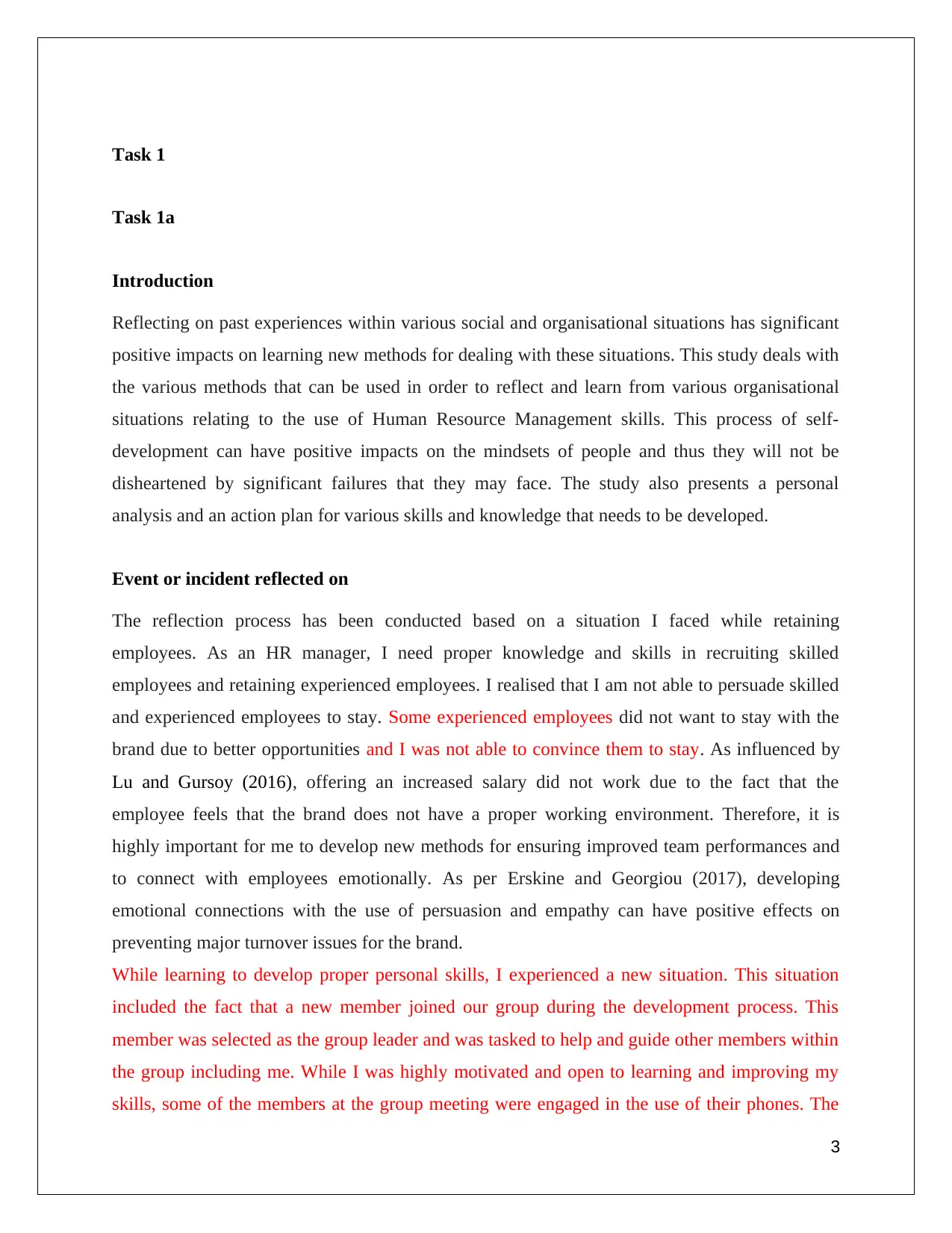
Task 1
Task 1a
Introduction
Reflecting on past experiences within various social and organisational situations has significant
positive impacts on learning new methods for dealing with these situations. This study deals with
the various methods that can be used in order to reflect and learn from various organisational
situations relating to the use of Human Resource Management skills. This process of self-
development can have positive impacts on the mindsets of people and thus they will not be
disheartened by significant failures that they may face. The study also presents a personal
analysis and an action plan for various skills and knowledge that needs to be developed.
Event or incident reflected on
The reflection process has been conducted based on a situation I faced while retaining
employees. As an HR manager, I need proper knowledge and skills in recruiting skilled
employees and retaining experienced employees. I realised that I am not able to persuade skilled
and experienced employees to stay. Some experienced employees did not want to stay with the
brand due to better opportunities and I was not able to convince them to stay. As influenced by
Lu and Gursoy (2016), offering an increased salary did not work due to the fact that the
employee feels that the brand does not have a proper working environment. Therefore, it is
highly important for me to develop new methods for ensuring improved team performances and
to connect with employees emotionally. As per Erskine and Georgiou (2017), developing
emotional connections with the use of persuasion and empathy can have positive effects on
preventing major turnover issues for the brand.
While learning to develop proper personal skills, I experienced a new situation. This situation
included the fact that a new member joined our group during the development process. This
member was selected as the group leader and was tasked to help and guide other members within
the group including me. While I was highly motivated and open to learning and improving my
skills, some of the members at the group meeting were engaged in the use of their phones. The
3
Task 1a
Introduction
Reflecting on past experiences within various social and organisational situations has significant
positive impacts on learning new methods for dealing with these situations. This study deals with
the various methods that can be used in order to reflect and learn from various organisational
situations relating to the use of Human Resource Management skills. This process of self-
development can have positive impacts on the mindsets of people and thus they will not be
disheartened by significant failures that they may face. The study also presents a personal
analysis and an action plan for various skills and knowledge that needs to be developed.
Event or incident reflected on
The reflection process has been conducted based on a situation I faced while retaining
employees. As an HR manager, I need proper knowledge and skills in recruiting skilled
employees and retaining experienced employees. I realised that I am not able to persuade skilled
and experienced employees to stay. Some experienced employees did not want to stay with the
brand due to better opportunities and I was not able to convince them to stay. As influenced by
Lu and Gursoy (2016), offering an increased salary did not work due to the fact that the
employee feels that the brand does not have a proper working environment. Therefore, it is
highly important for me to develop new methods for ensuring improved team performances and
to connect with employees emotionally. As per Erskine and Georgiou (2017), developing
emotional connections with the use of persuasion and empathy can have positive effects on
preventing major turnover issues for the brand.
While learning to develop proper personal skills, I experienced a new situation. This situation
included the fact that a new member joined our group during the development process. This
member was selected as the group leader and was tasked to help and guide other members within
the group including me. While I was highly motivated and open to learning and improving my
skills, some of the members at the group meeting were engaged in the use of their phones. The
3
Paraphrase This Document
Need a fresh take? Get an instant paraphrase of this document with our AI Paraphraser
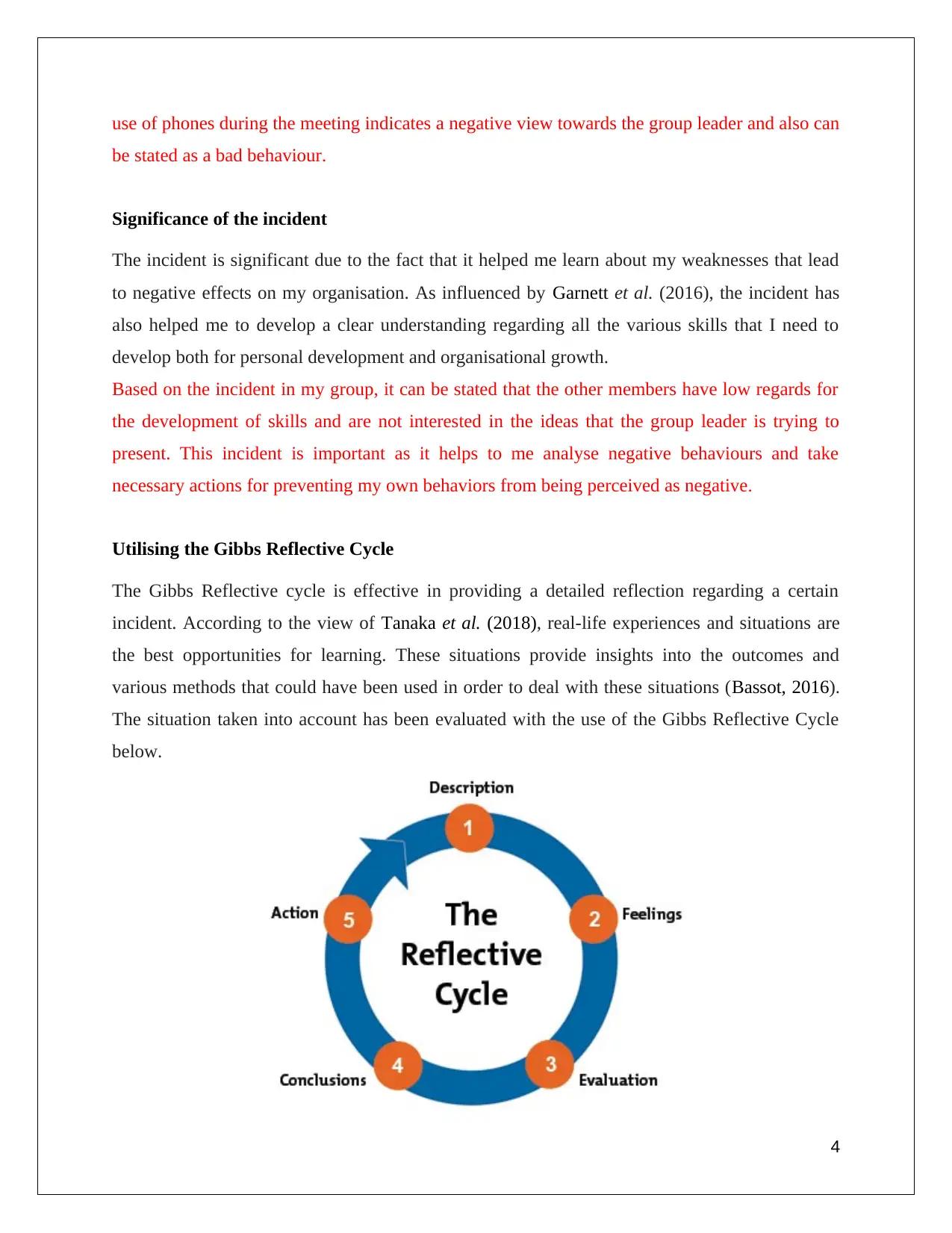
use of phones during the meeting indicates a negative view towards the group leader and also can
be stated as a bad behaviour.
Significance of the incident
The incident is significant due to the fact that it helped me learn about my weaknesses that lead
to negative effects on my organisation. As influenced by Garnett et al. (2016), the incident has
also helped me to develop a clear understanding regarding all the various skills that I need to
develop both for personal development and organisational growth.
Based on the incident in my group, it can be stated that the other members have low regards for
the development of skills and are not interested in the ideas that the group leader is trying to
present. This incident is important as it helps to me analyse negative behaviours and take
necessary actions for preventing my own behaviors from being perceived as negative.
Utilising the Gibbs Reflective Cycle
The Gibbs Reflective cycle is effective in providing a detailed reflection regarding a certain
incident. According to the view of Tanaka et al. (2018), real-life experiences and situations are
the best opportunities for learning. These situations provide insights into the outcomes and
various methods that could have been used in order to deal with these situations (Bassot, 2016).
The situation taken into account has been evaluated with the use of the Gibbs Reflective Cycle
below.
4
be stated as a bad behaviour.
Significance of the incident
The incident is significant due to the fact that it helped me learn about my weaknesses that lead
to negative effects on my organisation. As influenced by Garnett et al. (2016), the incident has
also helped me to develop a clear understanding regarding all the various skills that I need to
develop both for personal development and organisational growth.
Based on the incident in my group, it can be stated that the other members have low regards for
the development of skills and are not interested in the ideas that the group leader is trying to
present. This incident is important as it helps to me analyse negative behaviours and take
necessary actions for preventing my own behaviors from being perceived as negative.
Utilising the Gibbs Reflective Cycle
The Gibbs Reflective cycle is effective in providing a detailed reflection regarding a certain
incident. According to the view of Tanaka et al. (2018), real-life experiences and situations are
the best opportunities for learning. These situations provide insights into the outcomes and
various methods that could have been used in order to deal with these situations (Bassot, 2016).
The situation taken into account has been evaluated with the use of the Gibbs Reflective Cycle
below.
4
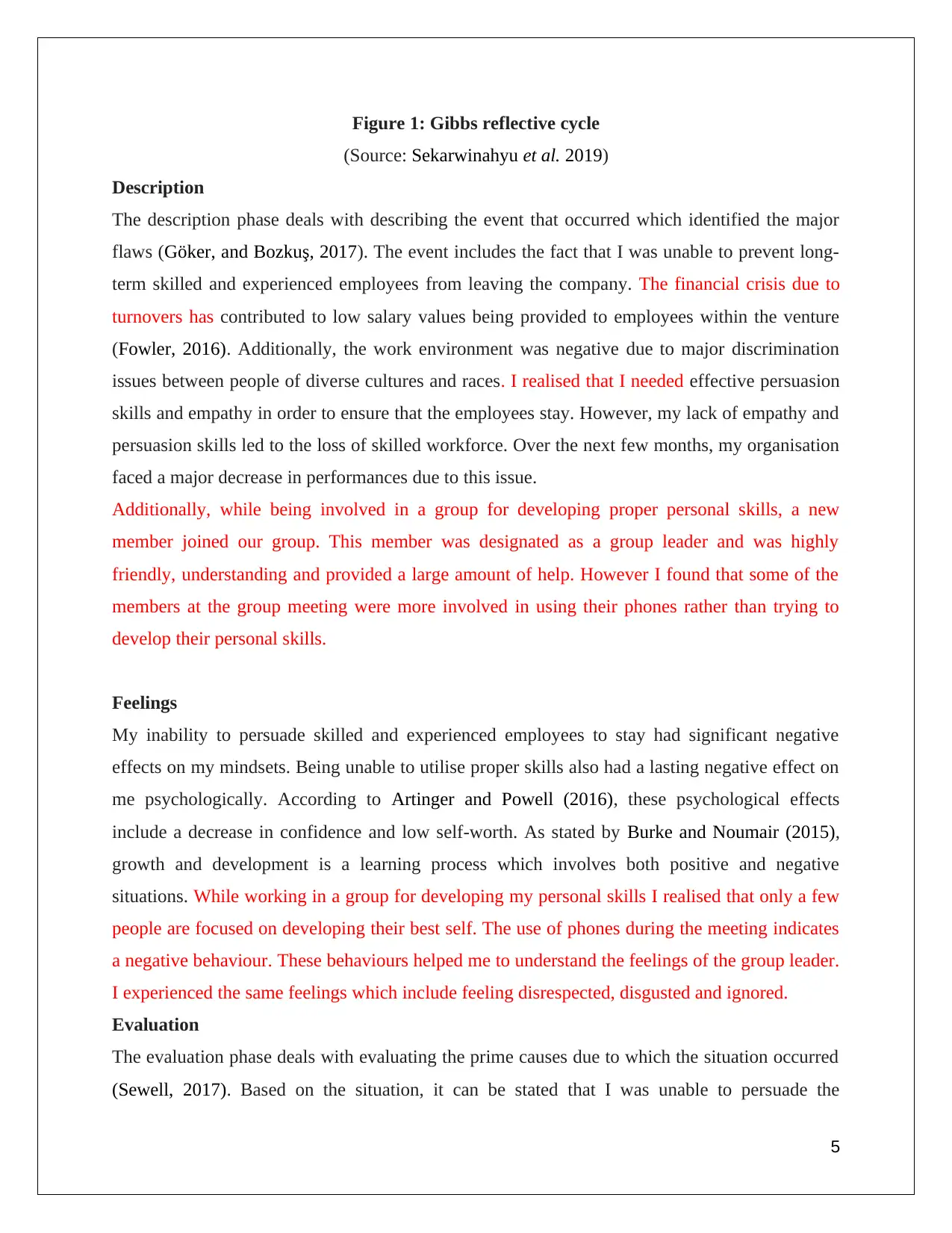
Figure 1: Gibbs reflective cycle
(Source: Sekarwinahyu et al. 2019)
Description
The description phase deals with describing the event that occurred which identified the major
flaws (Göker, and Bozkuş, 2017). The event includes the fact that I was unable to prevent long-
term skilled and experienced employees from leaving the company. The financial crisis due to
turnovers has contributed to low salary values being provided to employees within the venture
(Fowler, 2016). Additionally, the work environment was negative due to major discrimination
issues between people of diverse cultures and races. I realised that I needed effective persuasion
skills and empathy in order to ensure that the employees stay. However, my lack of empathy and
persuasion skills led to the loss of skilled workforce. Over the next few months, my organisation
faced a major decrease in performances due to this issue.
Additionally, while being involved in a group for developing proper personal skills, a new
member joined our group. This member was designated as a group leader and was highly
friendly, understanding and provided a large amount of help. However I found that some of the
members at the group meeting were more involved in using their phones rather than trying to
develop their personal skills.
Feelings
My inability to persuade skilled and experienced employees to stay had significant negative
effects on my mindsets. Being unable to utilise proper skills also had a lasting negative effect on
me psychologically. According to Artinger and Powell (2016), these psychological effects
include a decrease in confidence and low self-worth. As stated by Burke and Noumair (2015),
growth and development is a learning process which involves both positive and negative
situations. While working in a group for developing my personal skills I realised that only a few
people are focused on developing their best self. The use of phones during the meeting indicates
a negative behaviour. These behaviours helped me to understand the feelings of the group leader.
I experienced the same feelings which include feeling disrespected, disgusted and ignored.
Evaluation
The evaluation phase deals with evaluating the prime causes due to which the situation occurred
(Sewell, 2017). Based on the situation, it can be stated that I was unable to persuade the
5
(Source: Sekarwinahyu et al. 2019)
Description
The description phase deals with describing the event that occurred which identified the major
flaws (Göker, and Bozkuş, 2017). The event includes the fact that I was unable to prevent long-
term skilled and experienced employees from leaving the company. The financial crisis due to
turnovers has contributed to low salary values being provided to employees within the venture
(Fowler, 2016). Additionally, the work environment was negative due to major discrimination
issues between people of diverse cultures and races. I realised that I needed effective persuasion
skills and empathy in order to ensure that the employees stay. However, my lack of empathy and
persuasion skills led to the loss of skilled workforce. Over the next few months, my organisation
faced a major decrease in performances due to this issue.
Additionally, while being involved in a group for developing proper personal skills, a new
member joined our group. This member was designated as a group leader and was highly
friendly, understanding and provided a large amount of help. However I found that some of the
members at the group meeting were more involved in using their phones rather than trying to
develop their personal skills.
Feelings
My inability to persuade skilled and experienced employees to stay had significant negative
effects on my mindsets. Being unable to utilise proper skills also had a lasting negative effect on
me psychologically. According to Artinger and Powell (2016), these psychological effects
include a decrease in confidence and low self-worth. As stated by Burke and Noumair (2015),
growth and development is a learning process which involves both positive and negative
situations. While working in a group for developing my personal skills I realised that only a few
people are focused on developing their best self. The use of phones during the meeting indicates
a negative behaviour. These behaviours helped me to understand the feelings of the group leader.
I experienced the same feelings which include feeling disrespected, disgusted and ignored.
Evaluation
The evaluation phase deals with evaluating the prime causes due to which the situation occurred
(Sewell, 2017). Based on the situation, it can be stated that I was unable to persuade the
5
⊘ This is a preview!⊘
Do you want full access?
Subscribe today to unlock all pages.

Trusted by 1+ million students worldwide
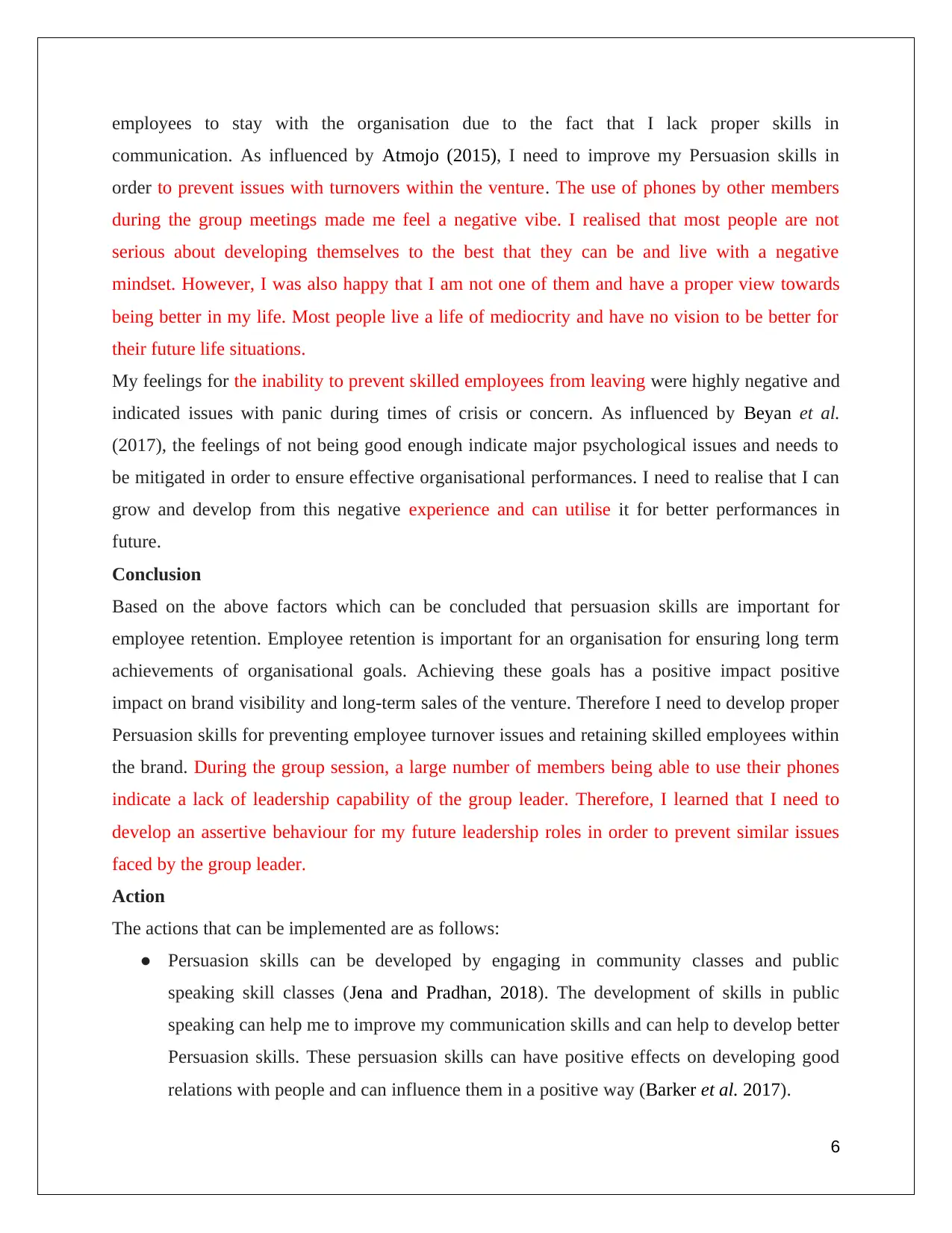
employees to stay with the organisation due to the fact that I lack proper skills in
communication. As influenced by Atmojo (2015), I need to improve my Persuasion skills in
order to prevent issues with turnovers within the venture. The use of phones by other members
during the group meetings made me feel a negative vibe. I realised that most people are not
serious about developing themselves to the best that they can be and live with a negative
mindset. However, I was also happy that I am not one of them and have a proper view towards
being better in my life. Most people live a life of mediocrity and have no vision to be better for
their future life situations.
My feelings for the inability to prevent skilled employees from leaving were highly negative and
indicated issues with panic during times of crisis or concern. As influenced by Beyan et al.
(2017), the feelings of not being good enough indicate major psychological issues and needs to
be mitigated in order to ensure effective organisational performances. I need to realise that I can
grow and develop from this negative experience and can utilise it for better performances in
future.
Conclusion
Based on the above factors which can be concluded that persuasion skills are important for
employee retention. Employee retention is important for an organisation for ensuring long term
achievements of organisational goals. Achieving these goals has a positive impact positive
impact on brand visibility and long-term sales of the venture. Therefore I need to develop proper
Persuasion skills for preventing employee turnover issues and retaining skilled employees within
the brand. During the group session, a large number of members being able to use their phones
indicate a lack of leadership capability of the group leader. Therefore, I learned that I need to
develop an assertive behaviour for my future leadership roles in order to prevent similar issues
faced by the group leader.
Action
The actions that can be implemented are as follows:
● Persuasion skills can be developed by engaging in community classes and public
speaking skill classes (Jena and Pradhan, 2018). The development of skills in public
speaking can help me to improve my communication skills and can help to develop better
Persuasion skills. These persuasion skills can have positive effects on developing good
relations with people and can influence them in a positive way (Barker et al. 2017).
6
communication. As influenced by Atmojo (2015), I need to improve my Persuasion skills in
order to prevent issues with turnovers within the venture. The use of phones by other members
during the group meetings made me feel a negative vibe. I realised that most people are not
serious about developing themselves to the best that they can be and live with a negative
mindset. However, I was also happy that I am not one of them and have a proper view towards
being better in my life. Most people live a life of mediocrity and have no vision to be better for
their future life situations.
My feelings for the inability to prevent skilled employees from leaving were highly negative and
indicated issues with panic during times of crisis or concern. As influenced by Beyan et al.
(2017), the feelings of not being good enough indicate major psychological issues and needs to
be mitigated in order to ensure effective organisational performances. I need to realise that I can
grow and develop from this negative experience and can utilise it for better performances in
future.
Conclusion
Based on the above factors which can be concluded that persuasion skills are important for
employee retention. Employee retention is important for an organisation for ensuring long term
achievements of organisational goals. Achieving these goals has a positive impact positive
impact on brand visibility and long-term sales of the venture. Therefore I need to develop proper
Persuasion skills for preventing employee turnover issues and retaining skilled employees within
the brand. During the group session, a large number of members being able to use their phones
indicate a lack of leadership capability of the group leader. Therefore, I learned that I need to
develop an assertive behaviour for my future leadership roles in order to prevent similar issues
faced by the group leader.
Action
The actions that can be implemented are as follows:
● Persuasion skills can be developed by engaging in community classes and public
speaking skill classes (Jena and Pradhan, 2018). The development of skills in public
speaking can help me to improve my communication skills and can help to develop better
Persuasion skills. These persuasion skills can have positive effects on developing good
relations with people and can influence them in a positive way (Barker et al. 2017).
6
Paraphrase This Document
Need a fresh take? Get an instant paraphrase of this document with our AI Paraphraser
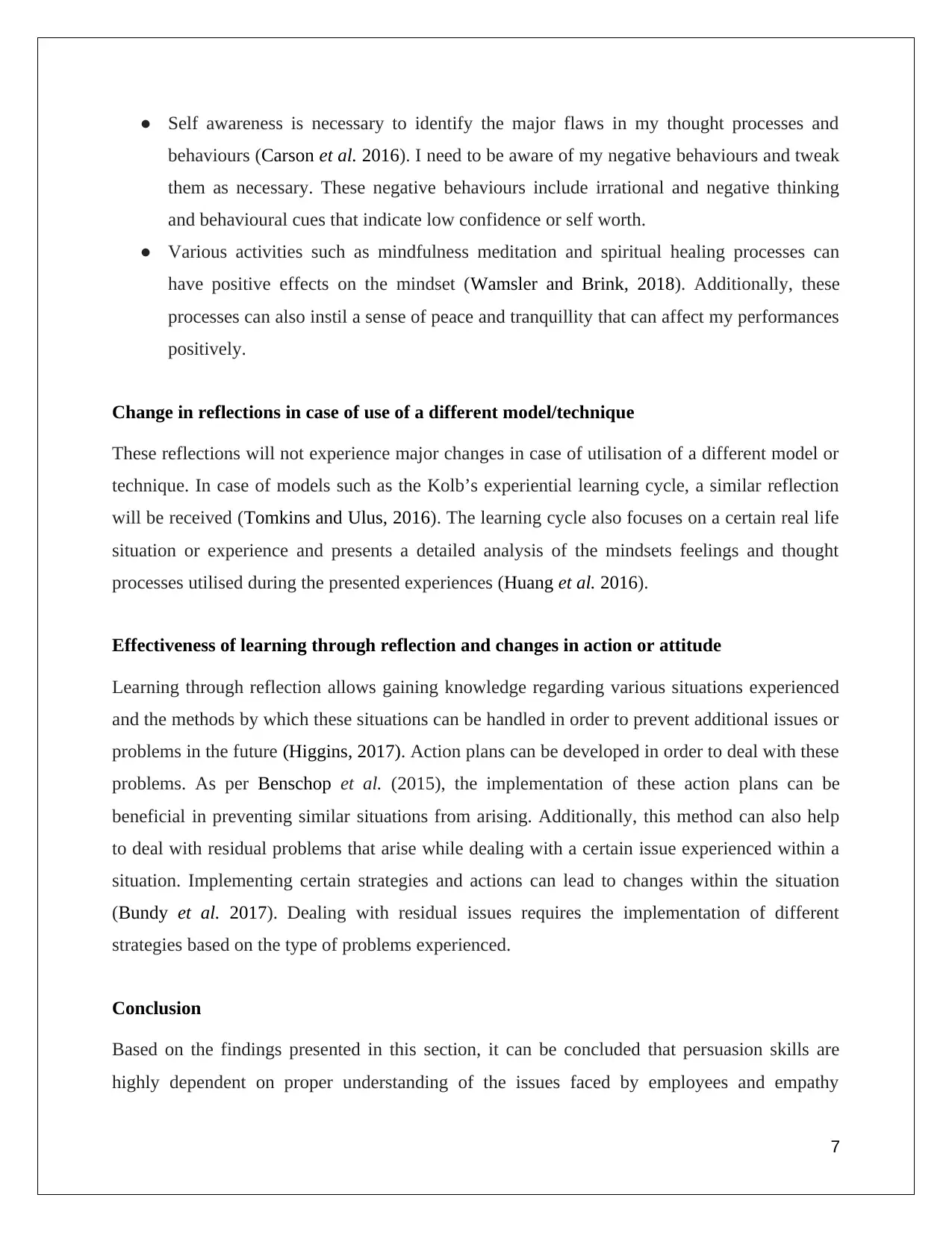
● Self awareness is necessary to identify the major flaws in my thought processes and
behaviours (Carson et al. 2016). I need to be aware of my negative behaviours and tweak
them as necessary. These negative behaviours include irrational and negative thinking
and behavioural cues that indicate low confidence or self worth.
● Various activities such as mindfulness meditation and spiritual healing processes can
have positive effects on the mindset (Wamsler and Brink, 2018). Additionally, these
processes can also instil a sense of peace and tranquillity that can affect my performances
positively.
Change in reflections in case of use of a different model/technique
These reflections will not experience major changes in case of utilisation of a different model or
technique. In case of models such as the Kolb’s experiential learning cycle, a similar reflection
will be received (Tomkins and Ulus, 2016). The learning cycle also focuses on a certain real life
situation or experience and presents a detailed analysis of the mindsets feelings and thought
processes utilised during the presented experiences (Huang et al. 2016).
Effectiveness of learning through reflection and changes in action or attitude
Learning through reflection allows gaining knowledge regarding various situations experienced
and the methods by which these situations can be handled in order to prevent additional issues or
problems in the future (Higgins, 2017). Action plans can be developed in order to deal with these
problems. As per Benschop et al. (2015), the implementation of these action plans can be
beneficial in preventing similar situations from arising. Additionally, this method can also help
to deal with residual problems that arise while dealing with a certain issue experienced within a
situation. Implementing certain strategies and actions can lead to changes within the situation
(Bundy et al. 2017). Dealing with residual issues requires the implementation of different
strategies based on the type of problems experienced.
Conclusion
Based on the findings presented in this section, it can be concluded that persuasion skills are
highly dependent on proper understanding of the issues faced by employees and empathy
7
behaviours (Carson et al. 2016). I need to be aware of my negative behaviours and tweak
them as necessary. These negative behaviours include irrational and negative thinking
and behavioural cues that indicate low confidence or self worth.
● Various activities such as mindfulness meditation and spiritual healing processes can
have positive effects on the mindset (Wamsler and Brink, 2018). Additionally, these
processes can also instil a sense of peace and tranquillity that can affect my performances
positively.
Change in reflections in case of use of a different model/technique
These reflections will not experience major changes in case of utilisation of a different model or
technique. In case of models such as the Kolb’s experiential learning cycle, a similar reflection
will be received (Tomkins and Ulus, 2016). The learning cycle also focuses on a certain real life
situation or experience and presents a detailed analysis of the mindsets feelings and thought
processes utilised during the presented experiences (Huang et al. 2016).
Effectiveness of learning through reflection and changes in action or attitude
Learning through reflection allows gaining knowledge regarding various situations experienced
and the methods by which these situations can be handled in order to prevent additional issues or
problems in the future (Higgins, 2017). Action plans can be developed in order to deal with these
problems. As per Benschop et al. (2015), the implementation of these action plans can be
beneficial in preventing similar situations from arising. Additionally, this method can also help
to deal with residual problems that arise while dealing with a certain issue experienced within a
situation. Implementing certain strategies and actions can lead to changes within the situation
(Bundy et al. 2017). Dealing with residual issues requires the implementation of different
strategies based on the type of problems experienced.
Conclusion
Based on the findings presented in this section, it can be concluded that persuasion skills are
highly dependent on proper understanding of the issues faced by employees and empathy
7
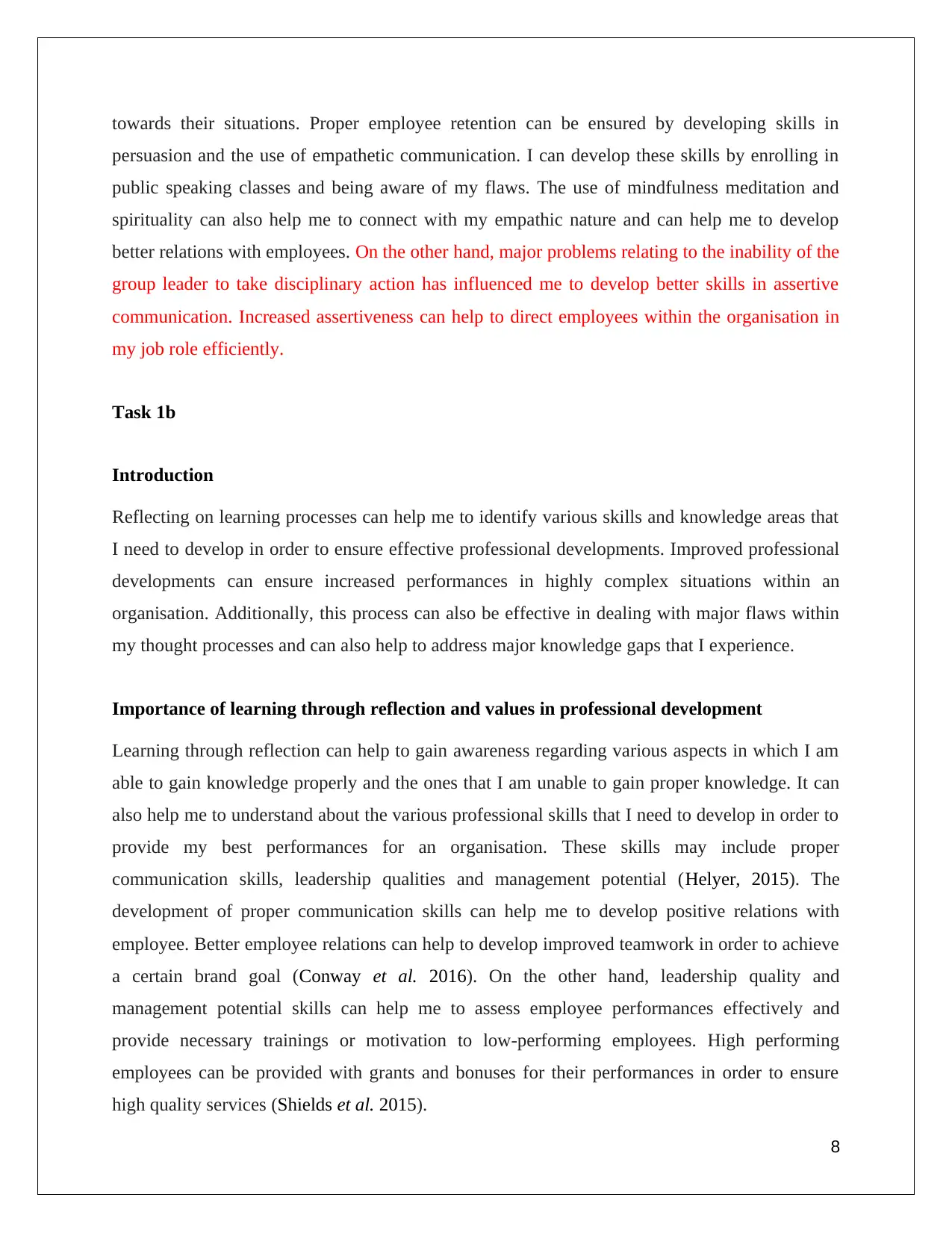
towards their situations. Proper employee retention can be ensured by developing skills in
persuasion and the use of empathetic communication. I can develop these skills by enrolling in
public speaking classes and being aware of my flaws. The use of mindfulness meditation and
spirituality can also help me to connect with my empathic nature and can help me to develop
better relations with employees. On the other hand, major problems relating to the inability of the
group leader to take disciplinary action has influenced me to develop better skills in assertive
communication. Increased assertiveness can help to direct employees within the organisation in
my job role efficiently.
Task 1b
Introduction
Reflecting on learning processes can help me to identify various skills and knowledge areas that
I need to develop in order to ensure effective professional developments. Improved professional
developments can ensure increased performances in highly complex situations within an
organisation. Additionally, this process can also be effective in dealing with major flaws within
my thought processes and can also help to address major knowledge gaps that I experience.
Importance of learning through reflection and values in professional development
Learning through reflection can help to gain awareness regarding various aspects in which I am
able to gain knowledge properly and the ones that I am unable to gain proper knowledge. It can
also help me to understand about the various professional skills that I need to develop in order to
provide my best performances for an organisation. These skills may include proper
communication skills, leadership qualities and management potential (Helyer, 2015). The
development of proper communication skills can help me to develop positive relations with
employee. Better employee relations can help to develop improved teamwork in order to achieve
a certain brand goal (Conway et al. 2016). On the other hand, leadership quality and
management potential skills can help me to assess employee performances effectively and
provide necessary trainings or motivation to low-performing employees. High performing
employees can be provided with grants and bonuses for their performances in order to ensure
high quality services (Shields et al. 2015).
8
persuasion and the use of empathetic communication. I can develop these skills by enrolling in
public speaking classes and being aware of my flaws. The use of mindfulness meditation and
spirituality can also help me to connect with my empathic nature and can help me to develop
better relations with employees. On the other hand, major problems relating to the inability of the
group leader to take disciplinary action has influenced me to develop better skills in assertive
communication. Increased assertiveness can help to direct employees within the organisation in
my job role efficiently.
Task 1b
Introduction
Reflecting on learning processes can help me to identify various skills and knowledge areas that
I need to develop in order to ensure effective professional developments. Improved professional
developments can ensure increased performances in highly complex situations within an
organisation. Additionally, this process can also be effective in dealing with major flaws within
my thought processes and can also help to address major knowledge gaps that I experience.
Importance of learning through reflection and values in professional development
Learning through reflection can help to gain awareness regarding various aspects in which I am
able to gain knowledge properly and the ones that I am unable to gain proper knowledge. It can
also help me to understand about the various professional skills that I need to develop in order to
provide my best performances for an organisation. These skills may include proper
communication skills, leadership qualities and management potential (Helyer, 2015). The
development of proper communication skills can help me to develop positive relations with
employee. Better employee relations can help to develop improved teamwork in order to achieve
a certain brand goal (Conway et al. 2016). On the other hand, leadership quality and
management potential skills can help me to assess employee performances effectively and
provide necessary trainings or motivation to low-performing employees. High performing
employees can be provided with grants and bonuses for their performances in order to ensure
high quality services (Shields et al. 2015).
8
⊘ This is a preview!⊘
Do you want full access?
Subscribe today to unlock all pages.

Trusted by 1+ million students worldwide
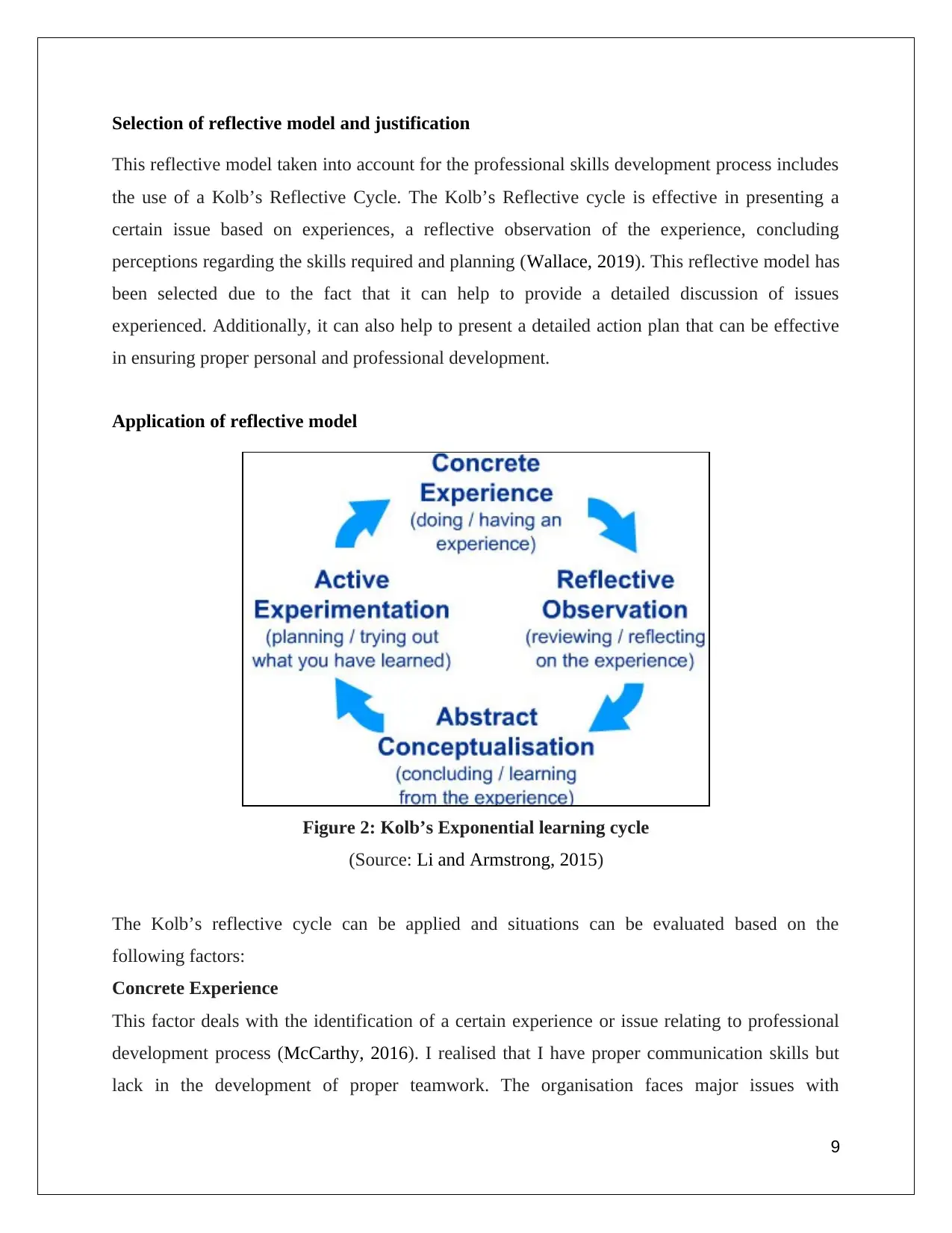
Selection of reflective model and justification
This reflective model taken into account for the professional skills development process includes
the use of a Kolb’s Reflective Cycle. The Kolb’s Reflective cycle is effective in presenting a
certain issue based on experiences, a reflective observation of the experience, concluding
perceptions regarding the skills required and planning (Wallace, 2019). This reflective model has
been selected due to the fact that it can help to provide a detailed discussion of issues
experienced. Additionally, it can also help to present a detailed action plan that can be effective
in ensuring proper personal and professional development.
Application of reflective model
Figure 2: Kolb’s Exponential learning cycle
(Source: Li and Armstrong, 2015)
The Kolb’s reflective cycle can be applied and situations can be evaluated based on the
following factors:
Concrete Experience
This factor deals with the identification of a certain experience or issue relating to professional
development process (McCarthy, 2016). I realised that I have proper communication skills but
lack in the development of proper teamwork. The organisation faces major issues with
9
This reflective model taken into account for the professional skills development process includes
the use of a Kolb’s Reflective Cycle. The Kolb’s Reflective cycle is effective in presenting a
certain issue based on experiences, a reflective observation of the experience, concluding
perceptions regarding the skills required and planning (Wallace, 2019). This reflective model has
been selected due to the fact that it can help to provide a detailed discussion of issues
experienced. Additionally, it can also help to present a detailed action plan that can be effective
in ensuring proper personal and professional development.
Application of reflective model
Figure 2: Kolb’s Exponential learning cycle
(Source: Li and Armstrong, 2015)
The Kolb’s reflective cycle can be applied and situations can be evaluated based on the
following factors:
Concrete Experience
This factor deals with the identification of a certain experience or issue relating to professional
development process (McCarthy, 2016). I realised that I have proper communication skills but
lack in the development of proper teamwork. The organisation faces major issues with
9
Paraphrase This Document
Need a fresh take? Get an instant paraphrase of this document with our AI Paraphraser
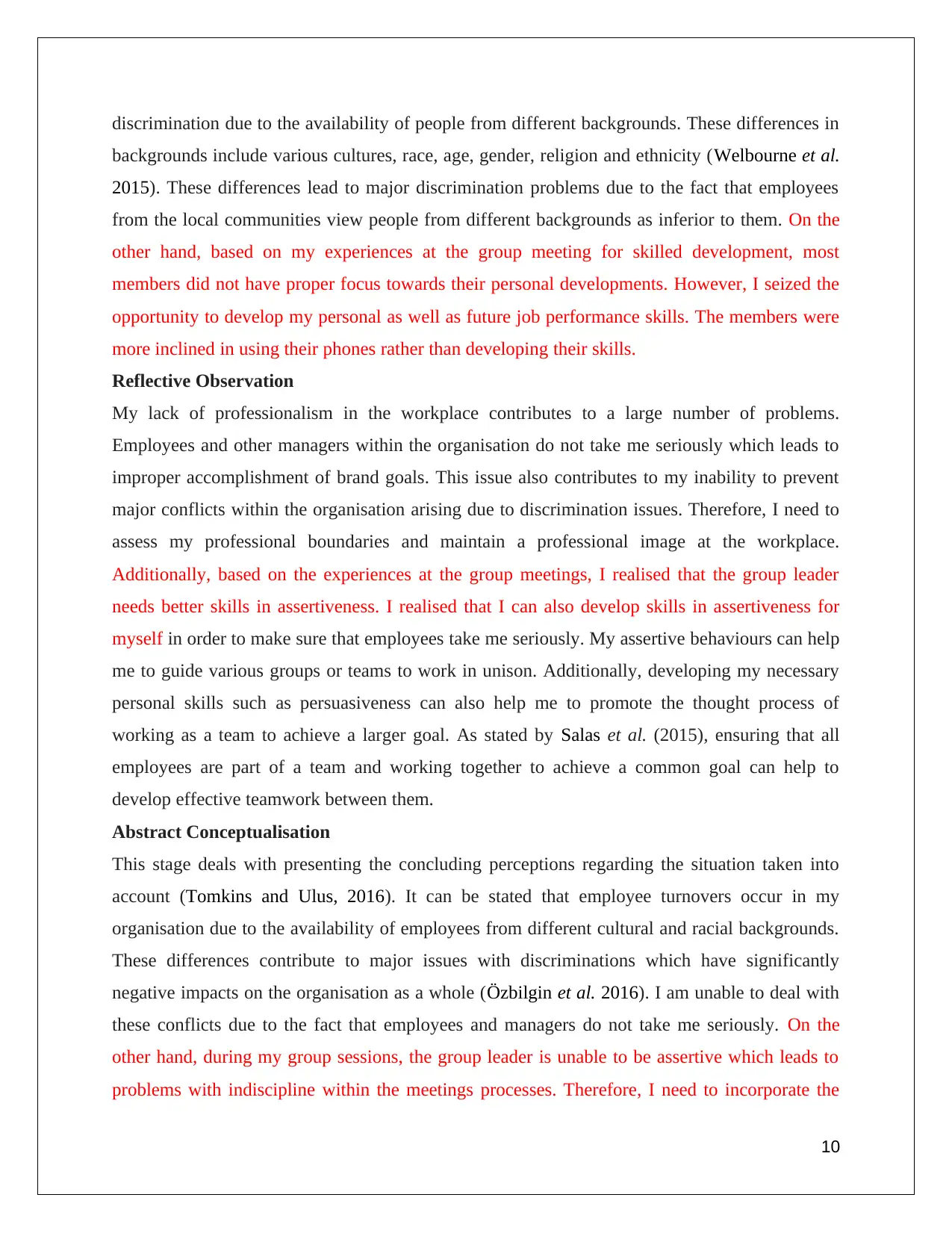
discrimination due to the availability of people from different backgrounds. These differences in
backgrounds include various cultures, race, age, gender, religion and ethnicity (Welbourne et al.
2015). These differences lead to major discrimination problems due to the fact that employees
from the local communities view people from different backgrounds as inferior to them. On the
other hand, based on my experiences at the group meeting for skilled development, most
members did not have proper focus towards their personal developments. However, I seized the
opportunity to develop my personal as well as future job performance skills. The members were
more inclined in using their phones rather than developing their skills.
Reflective Observation
My lack of professionalism in the workplace contributes to a large number of problems.
Employees and other managers within the organisation do not take me seriously which leads to
improper accomplishment of brand goals. This issue also contributes to my inability to prevent
major conflicts within the organisation arising due to discrimination issues. Therefore, I need to
assess my professional boundaries and maintain a professional image at the workplace.
Additionally, based on the experiences at the group meetings, I realised that the group leader
needs better skills in assertiveness. I realised that I can also develop skills in assertiveness for
myself in order to make sure that employees take me seriously. My assertive behaviours can help
me to guide various groups or teams to work in unison. Additionally, developing my necessary
personal skills such as persuasiveness can also help me to promote the thought process of
working as a team to achieve a larger goal. As stated by Salas et al. (2015), ensuring that all
employees are part of a team and working together to achieve a common goal can help to
develop effective teamwork between them.
Abstract Conceptualisation
This stage deals with presenting the concluding perceptions regarding the situation taken into
account (Tomkins and Ulus, 2016). It can be stated that employee turnovers occur in my
organisation due to the availability of employees from different cultural and racial backgrounds.
These differences contribute to major issues with discriminations which have significantly
negative impacts on the organisation as a whole (Özbilgin et al. 2016). I am unable to deal with
these conflicts due to the fact that employees and managers do not take me seriously. On the
other hand, during my group sessions, the group leader is unable to be assertive which leads to
problems with indiscipline within the meetings processes. Therefore, I need to incorporate the
10
backgrounds include various cultures, race, age, gender, religion and ethnicity (Welbourne et al.
2015). These differences lead to major discrimination problems due to the fact that employees
from the local communities view people from different backgrounds as inferior to them. On the
other hand, based on my experiences at the group meeting for skilled development, most
members did not have proper focus towards their personal developments. However, I seized the
opportunity to develop my personal as well as future job performance skills. The members were
more inclined in using their phones rather than developing their skills.
Reflective Observation
My lack of professionalism in the workplace contributes to a large number of problems.
Employees and other managers within the organisation do not take me seriously which leads to
improper accomplishment of brand goals. This issue also contributes to my inability to prevent
major conflicts within the organisation arising due to discrimination issues. Therefore, I need to
assess my professional boundaries and maintain a professional image at the workplace.
Additionally, based on the experiences at the group meetings, I realised that the group leader
needs better skills in assertiveness. I realised that I can also develop skills in assertiveness for
myself in order to make sure that employees take me seriously. My assertive behaviours can help
me to guide various groups or teams to work in unison. Additionally, developing my necessary
personal skills such as persuasiveness can also help me to promote the thought process of
working as a team to achieve a larger goal. As stated by Salas et al. (2015), ensuring that all
employees are part of a team and working together to achieve a common goal can help to
develop effective teamwork between them.
Abstract Conceptualisation
This stage deals with presenting the concluding perceptions regarding the situation taken into
account (Tomkins and Ulus, 2016). It can be stated that employee turnovers occur in my
organisation due to the availability of employees from different cultural and racial backgrounds.
These differences contribute to major issues with discriminations which have significantly
negative impacts on the organisation as a whole (Özbilgin et al. 2016). I am unable to deal with
these conflicts due to the fact that employees and managers do not take me seriously. On the
other hand, during my group sessions, the group leader is unable to be assertive which leads to
problems with indiscipline within the meetings processes. Therefore, I need to incorporate the
10
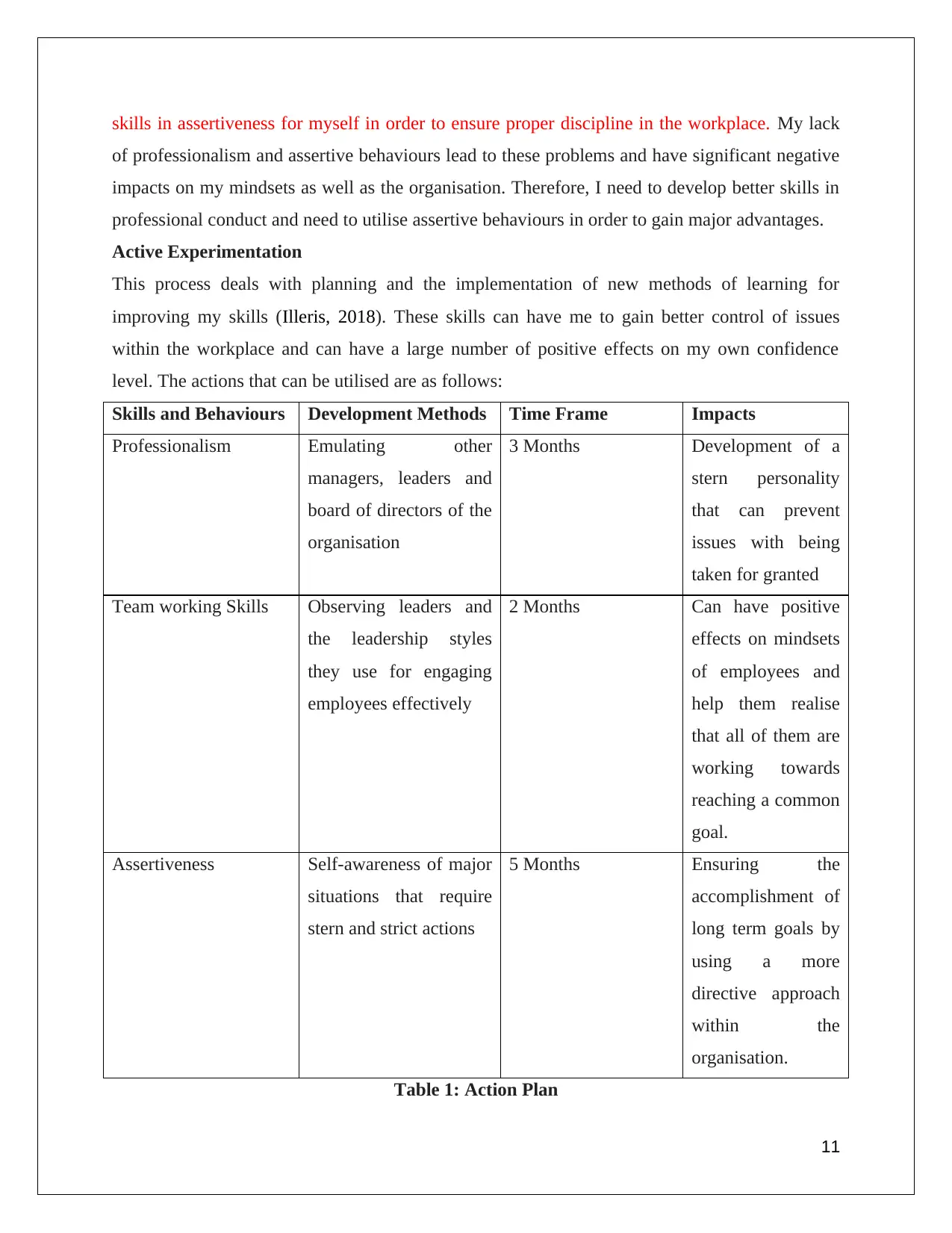
skills in assertiveness for myself in order to ensure proper discipline in the workplace. My lack
of professionalism and assertive behaviours lead to these problems and have significant negative
impacts on my mindsets as well as the organisation. Therefore, I need to develop better skills in
professional conduct and need to utilise assertive behaviours in order to gain major advantages.
Active Experimentation
This process deals with planning and the implementation of new methods of learning for
improving my skills (Illeris, 2018). These skills can have me to gain better control of issues
within the workplace and can have a large number of positive effects on my own confidence
level. The actions that can be utilised are as follows:
Skills and Behaviours Development Methods Time Frame Impacts
Professionalism Emulating other
managers, leaders and
board of directors of the
organisation
3 Months Development of a
stern personality
that can prevent
issues with being
taken for granted
Team working Skills Observing leaders and
the leadership styles
they use for engaging
employees effectively
2 Months Can have positive
effects on mindsets
of employees and
help them realise
that all of them are
working towards
reaching a common
goal.
Assertiveness Self-awareness of major
situations that require
stern and strict actions
5 Months Ensuring the
accomplishment of
long term goals by
using a more
directive approach
within the
organisation.
Table 1: Action Plan
11
of professionalism and assertive behaviours lead to these problems and have significant negative
impacts on my mindsets as well as the organisation. Therefore, I need to develop better skills in
professional conduct and need to utilise assertive behaviours in order to gain major advantages.
Active Experimentation
This process deals with planning and the implementation of new methods of learning for
improving my skills (Illeris, 2018). These skills can have me to gain better control of issues
within the workplace and can have a large number of positive effects on my own confidence
level. The actions that can be utilised are as follows:
Skills and Behaviours Development Methods Time Frame Impacts
Professionalism Emulating other
managers, leaders and
board of directors of the
organisation
3 Months Development of a
stern personality
that can prevent
issues with being
taken for granted
Team working Skills Observing leaders and
the leadership styles
they use for engaging
employees effectively
2 Months Can have positive
effects on mindsets
of employees and
help them realise
that all of them are
working towards
reaching a common
goal.
Assertiveness Self-awareness of major
situations that require
stern and strict actions
5 Months Ensuring the
accomplishment of
long term goals by
using a more
directive approach
within the
organisation.
Table 1: Action Plan
11
⊘ This is a preview!⊘
Do you want full access?
Subscribe today to unlock all pages.

Trusted by 1+ million students worldwide
1 out of 21
Related Documents
Your All-in-One AI-Powered Toolkit for Academic Success.
+13062052269
info@desklib.com
Available 24*7 on WhatsApp / Email
![[object Object]](/_next/static/media/star-bottom.7253800d.svg)
Unlock your academic potential
Copyright © 2020–2026 A2Z Services. All Rights Reserved. Developed and managed by ZUCOL.




